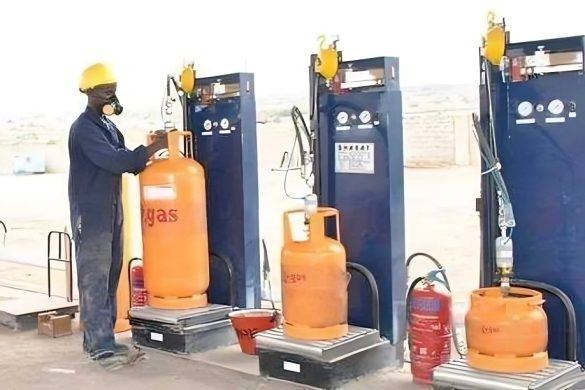KEY POINTS
- Cooking gas prices in Nigeria have risen sharply, now selling for ₦1,500 per kilogramme in some parts of Abuja.
- Ex-depot prices at refineries and depots such as Dangote, Ardova, and NIPCO have climbed to between ₦15,800 and ₦18,400 per metric tonne.
- The LPG marketers’ association blames the spike on artificial scarcity created by some dealers amid tightening supply.
Prices of Liquefied Petroleum Gas (LPG), commonly known as cooking gas, have continued their sharp climb across Nigeria, driven by tightening supply and opportunistic market practices.
Reports indicate that several gas outlets in Abuja and its outskirts found that the cost of 1 kilogramme of cooking gas has jumped to ₦1,500, up from ₦1,200 just last week.
For many households, the increase adds to the growing list of daily expenses that have become increasingly difficult to bear.
At the Gwarimpa and Dawaki districts of the Federal Capital Territory (FCT), a 12.5kg cylinder now sells for ₦17,500, compared to ₦15,000 the previous week. Even the Nigerian National Petroleum Company Limited (NNPCL) retail outlet along the Kubwa Expressway has not been spared, with prices climbing from ₦13,625 to ₦15,000 for the same volume.
Marketers Blame Depot Costs and Artificial Scarcity
The spike in retail prices follows a rise in ex-depot costs over the past week. Data from the gas market shows that Dangote Refinery’s ex-depot price for 20 metric tonnes of LPG now stands at ₦15,800, while Ardova, NIPCO and Shafa Energy are selling at ₦18,400. In contrast, some major marketers, including 11 Plc, AA Rano, Ranoil and Matrix, are reportedly running dry, worsening the scarcity in major cities such as Lagos and Kano.
Industry experts attribute part of the surge to supply bottlenecks. The National President of the Nigerian Association of Liquefied Petroleum Gas Marketers (NALPGAM), Oladapo Olatunbosun, said the current situation is being exploited by some marketers who are creating “artificial scarcity” to profit from rising demand.
Just last week, the price of cooking gas in Abuja had stabilised at around ₦1,200 per kilogramme, giving consumers a brief respite before this latest surge.
The continuous price hikes have left many Nigerians worried about affordability ahead of the year-end festive season, with several households already cutting back on usage or reverting to firewood and charcoal, options that carry significant health and environmental risks.



